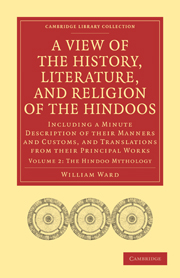 A View of the History, Literature, and Religion of the Hindoos
A View of the History, Literature, and Religion of the Hindoos Book contents
- Frontmatter
- Contents
- BOOK II OF THE TEMPLES, IMAGES, PRIESTS, AND TEMPLE WORSHIP OF THE HINDOOS
- BOOK III OF THE STATED PERIODS OF WORSHIP, AND VARIOUS DUTIES AND CEREMONIES
- BOOK V DOCTRINES OF THE HINDOO RELIGION
- CHAP. I OF THE TRANSMIGRATION OF SOULS
- CHAP. II JUDGMENT OF MEN AFTER DEATH
- CHAP. III OF FUTURE HAPPINESS
- CHAP. IV OF FUTURE PUNISHMENTS
- BOOK VI
- BOOK VII HINDOO RELIGIOUS SECTS
- CONCLUDING REMARKS
- APPENDIX: Scripture Illustrations from Hindoo Manners and Customs
CHAP. I - OF THE TRANSMIGRATION OF SOULS
Published online by Cambridge University Press: 29 August 2010
- Frontmatter
- Contents
- BOOK II OF THE TEMPLES, IMAGES, PRIESTS, AND TEMPLE WORSHIP OF THE HINDOOS
- BOOK III OF THE STATED PERIODS OF WORSHIP, AND VARIOUS DUTIES AND CEREMONIES
- BOOK V DOCTRINES OF THE HINDOO RELIGION
- CHAP. I OF THE TRANSMIGRATION OF SOULS
- CHAP. II JUDGMENT OF MEN AFTER DEATH
- CHAP. III OF FUTURE HAPPINESS
- CHAP. IV OF FUTURE PUNISHMENTS
- BOOK VI
- BOOK VII HINDOO RELIGIOUS SECTS
- CONCLUDING REMARKS
- APPENDIX: Scripture Illustrations from Hindoo Manners and Customs
Summary
After death, the person is conveyed by the messengers of Yŭmŭ through the air to the place of judgment. After receiving his sentence, he wanders about the earth for twelve months, as an aerial being or ghost; and then takes a body suited to his future condition, whether he ascend to the gods, or suffer in a new body, or be hurled into some hell. This is the doctrine of several pooranŭs; others maintain, that immediately after death and judgment, the person suffers the pains of hell, and removes his sin by suffering; and then returns to the earth in some bodily form.
I add a few particulars respecting the transmigration of souls from the work called Kŭrmŭ-vipakŭ:—He who destroys a sacrifice will be punished in hell; he will afterwards be born again, and remain a fish for three years; and then ascend to human birth, but will be afflicted with a continual flux. He who kills an enemy subdued in war, will be cast into the hell Krŭkŭchŭ; after which he will become a bull, a deer, a tyger, a bitch, a fish, a man: in the last state he will die of the palsy. He who eats excellent food without giving any to others, wi'l be punished in hell 30,000 years, and then be born a musk-rat; then a deer; then a man whose body emits an offensive smell, and who prefers bad to excellent food.
- Type
- Chapter
- Information
- A View of the History, Literature, and Religion of the HindoosIncluding a Minute Description of their Manners and Customs, and Translations from their Principal Works, pp. 158 - 165Publisher: Cambridge University PressPrint publication year: 2010First published in: 1817


